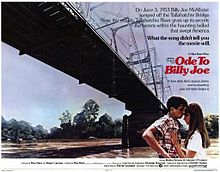- Ode to Billy Joe (film)
-
Ode to Billy Joe 
Directed by Max Baer, Jr. Produced by Max Baer, Jr. Written by Herman Raucher Starring Robby Benson
Glynnis O'ConnorMusic by Michel Legrand Cinematography Michel Hugo Editing by Frank Morriss Distributed by Warner Bros. Release date(s) 4 June 1976 Running time 105 min Country  United States
United StatesLanguage English Budget US $1.1 million Ode to Billy Joe is a 1976 film with a screenplay by Herman Raucher, inspired by the 1967 hit song by Bobbie Gentry, titled "Ode to Billie Joe" (note difference in spelling).
The film was directed and produced by Max Baer, Jr. (of The Beverly Hillbillies fame) and stars Robby Benson and Glynnis O'Connor. Made for $1.1 million, it grossed $27 million at the box office, plus earnings in excess of $2.65 million in the foreign market, $4.75 million from television, and $2.5 million from video.[citation needed]
Gentry's song recounts the day when Billie Joe McAllister committed suicide by jumping off the Tallahatchie Bridge on Choctaw Ridge, Mississippi. When Gentry and Raucher got together to work on the screenplay, she explained that while the song was based on an actual event, she had no idea why the real person who inspired the character of Billie Joe had killed himself[citation needed]. Raucher thus had a free hand to pick one.
Contents
Plot
Set in 1953, the film explores the budding relationship between McAllister (Benson) and Bobbie Lee Hartley (O'Connor) (who corresponds with the unnamed narrator of the original song), despite resistance from Hartley's family, who contend she is too young to date. One night at a jamboree, McAllister gets drunk and seems nauseous and confused when entering a makeshift whorehouse behind the gathering.
It turns out that in his inebriated state, he had sex with another man, later revealed to be his sawmill boss, Dewey Barksdale (James Best). After disappearing for days, he returns to bid an enigmatic goodbye to Bobbie Lee. Overcome with guilt, McAllister subsequently kills himself by jumping off the bridge spanning the Tallahatchie River. In the film's final scene, Bobbie Lee meets Dewey on the bridge as she is leaving town, and he guiltily confesses to her that he was the man. She tells Barksdale, who is on his way to her house to confess to her father, that the town already suspects that she is carrying Billy Joe's baby and that it would do no good for Barksdale to confess now. Agreeing with the girl's logic, Barksdale offers Bobbie Lee a ride to the bus station, which she courteously accepts.
On the set
Scenes at the old sawmill were filmed at Cross Lumber Company in Vaiden, Mississippi. The bridge featured in the film crossed the Yazoo River on County Road 512 near Sidon, Mississippi. It has since been demolished and replaced by a modern concrete span in 1987, with plaques at both the eastern and western ends commemorating the film. [1]
Release Date
The film was scheduled for release on June 3, 1976 to coincide with the opening lyrics of the song "It was the third of June..."; however, since most new motion picture releases in the U.S. occur on Friday, the date was moved up to Friday, June 4.
External links
Notes
- ^ The plaques are at 33°26′33″N 90°13′51″W / 33.44251°N 90.23093°W
Categories:- 1976 films
- 1970s drama films
- American drama films
- English-language films
- American LGBT-related films
- Films about suicide
- Films set in Mississippi
- Films based on songs
Wikimedia Foundation. 2010.
